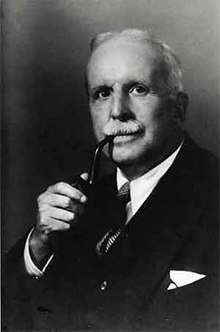Ernest Weekley
Ernest Weekley (27 April 1865 – 7 May 1954) was a British philologist, best known as the author of a number of works on etymology. His An Etymological Dictionary of Modern English (1921; 850 pages) has been cited as a source by most authors of similar books over the 90 years since it was published. From 1898 to 1938, he was Professor of Modern Languages at the University of Nottingham.

Weekley in 1935
He married Frieda von Richthofen in 1899. Together they had three children: Charles Montague (born 1900), Elsa Agnès (born 1902) and Barbara Joy (born 1904). Weekley divorced Frieda in 1913 following her elopement with D. H. Lawrence.
Selected bibliography
- The Romance of Words (1912; and subsequent editions in 1913 (2nd), 1917 (3rd), 1922 (4th) and 1928 (5th))
- The Romance of Names (1914; and subsequent editions in 1914 (2nd), 1922 (3rd) and 1928 (4th))
- Surnames (1916; and subsequent editions in 1917 (2nd) and 1936 (3rd)
- A Concise Etymological Dictionary of Modern English (1924)
- Words Ancient and Modern (1926)
- More Words Ancient and Modern (1927)
- Adjectives — and other words (1930)
- Words and Names (1932)
- Something about words (1935)
- Jack and Jill. A Study in Our Christian Names (1939)
- Words Ancient and Modern (new combined ed.) (1946)
gollark: That's the Nether.
gollark: Hmm, that reminds me, I need an electronics assembler.
gollark: Also, sending attack drones.
gollark: Plus SC weather forecast!
gollark: Possibly. This display is nice too though.
External links
- Works by Ernest Weekley at Project Gutenberg
- Works by or about Ernest Weekley at Internet Archive
- Works by Ernest Weekley at Open Library

This article is issued from Wikipedia. The text is licensed under Creative Commons - Attribution - Sharealike. Additional terms may apply for the media files.